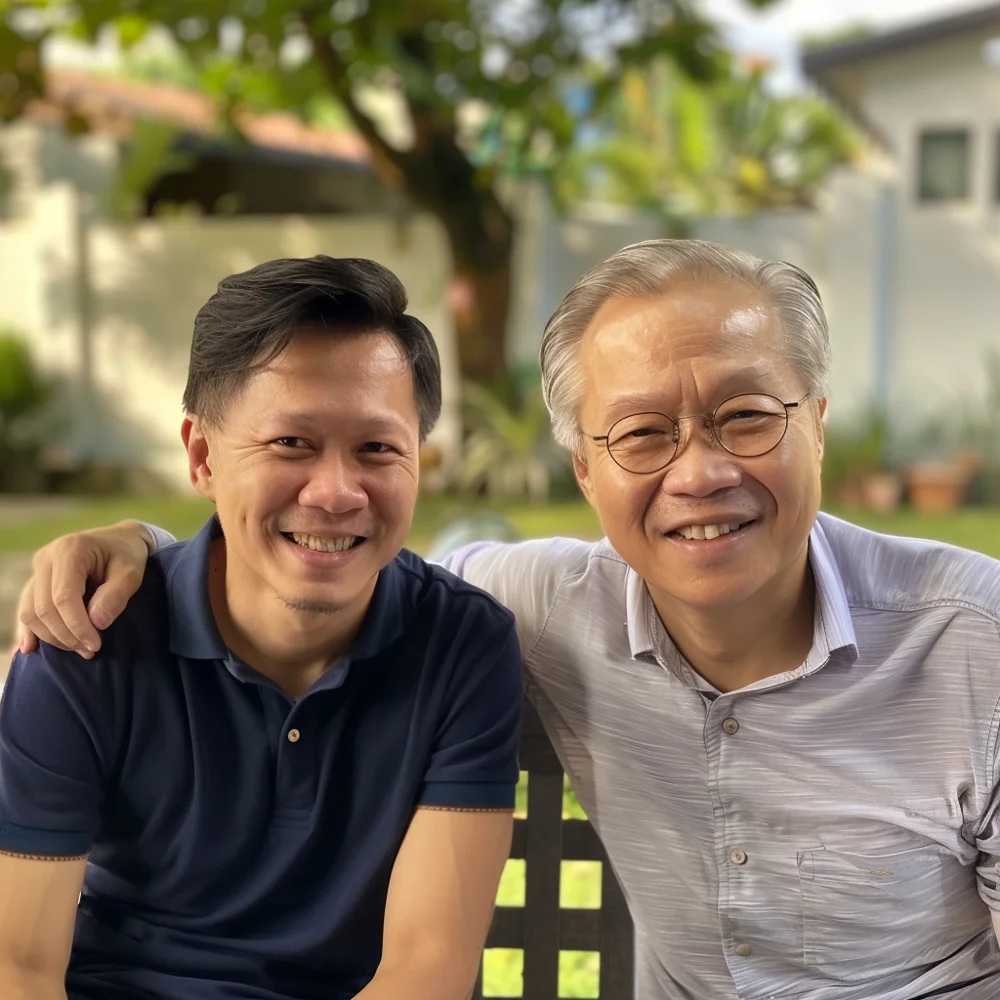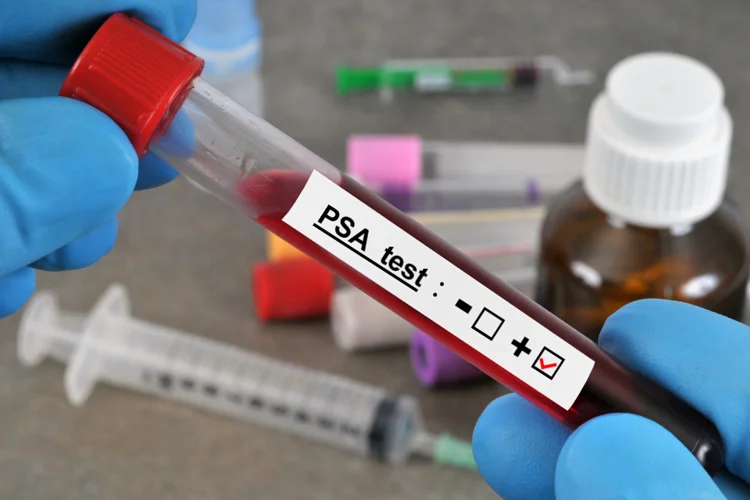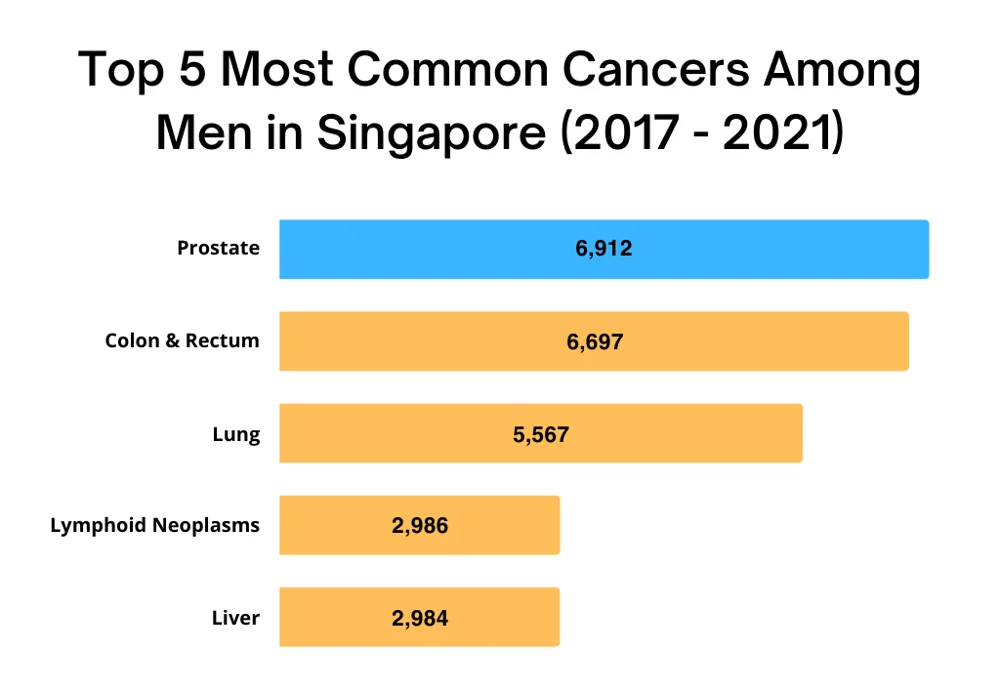Prostate Cancer Screening in Singapore
Last updated: Jan 15, 2026
What Is Prostate Cancer?
Prostate cancer is a type of cancer that
develops in the prostate gland, a small, walnut-shaped organ in the male
reproductive system responsible for producing seminal fluid. It occurs when cells in
the prostate begin to grow uncontrollably due to DNA changes.
These abnormal cells can form a tumour, which may spread to other parts of the body such as
lymph nodes and bones. While many prostate cancers grow slowly and remain localised,
more aggressive types can spread quickly and cause serious health problems.

Prostate Cancer in Singapore
Prostate cancer is the most common cancer among men in Singapore. Between 2017 and 2021, there were 6,912 cases diagnosed locally, accounting for 16.8% of all male cancer cases. Early detection through screening is critical for timely intervention and effective management of the disease, helping to prevent progression to advanced stages and improving treatment outcomes.
Signs & Symptoms of Prostate Cancer
Prostate cancer advances through different stages, and symptoms can appear in the following ways:
| Stages | Cancer Progression | Symptoms |
|---|---|---|
| Localised Prostate Cancer (T1) | Tumour is confined to the prostate and too small to be detected by physical exams or imaging. | Usually asymptomatic. |
| Localised Prostate Cancer (T2) | Cancer is still within the prostate but large enough to be detected by a physical exam or elevated Prostate-Specific Antigen (PSA) levels. | May include difficulty or pain while urinating, weak or interrupted urine stream, blood in urine or semen, and discomfort in the pelvic area. Erectile dysfunction may also occur. |
| Locally Advanced Prostate Cancer (T3) | Cancer has spread beyond the prostate's outer layer, possibly invading nearby tissues like the seminal vesicles. | Severe urinary problems, pelvic discomfort, bone or back pain, difficulty controlling bladder/bowel functions, fatigue, weight loss, leg weakness. |
| Locally Advanced Prostate Cancer (T4) | Cancer has spread to nearby organs such as the bladder, rectum, or pelvic wall. | Similar symptoms as T3, with increased severity and potential loss of bladder/bowel control. |
| Metastatic Prostate Cancer (M1) | Cancer has spread to distant organs like bones, lymph nodes, or other parts of the body. | Persistent bone pain, weight loss, fatigue, weakness, and loss of bladder/bowel control. |
Causes & Risk Factors for Prostate Cancer
The exact causes of prostate cancer are still not fully understood, but several risk factors significantly increase the likelihood of developing the disease:
- Family History: A strong family history of prostate cancer raises the risk.
- Age: Prostate cancer predominantly affects older men above 50, with the risk increasing significantly after 70 years.
- Ethnicity: Locally, Chinese men are at significantly higher risk of getting prostate cancer compared to Malay or Indian men.
- Diet: A diet high in red meat, dairy products, and animal fats has been linked to a higher risk of prostate cancer. A lack of fruits and vegetables may also increase susceptibility.

What Is Prostate Cancer Screening?
Screening for prostate cancer aims to detect the disease at an early stage when treatment
outcomes may be more favourable. The most commonly recommended screening test is the Prostate-Specific Antigen (PSA)
Test, which measures the level of PSA – a protein produced by both normal and
cancerous prostate cells. Elevated PSA levels may indicate prostate cancer, but they can
also suggest other non-cancerous conditions, such as benign prostatic hyperplasia
(BPH) or inflammation of the prostate.
If PSA levels are elevated, further diagnostic tests such as a digital rectal examination (DRE), prostate ultrasound, prostate biopsy, Magnetic Resonance Imaging (MRI), or Computed Tomography (CT)
scan may be performed to confirm the initial screening results and determine the
extent of the disease.

How Often Should You Screen for Prostate Cancer?
In Singapore, there are no specific guidelines for routine prostate cancer screening. However, men aged 50 and above are encouraged to consider screening. Those at higher risk, such as individuals with a family history of prostate or breast cancer, may benefit from starting screenings earlier and should consult with their doctors to determine the best approach.
Cost of Prostate Cancer Screenings
At ATA Medical, we offer screenings for prostate cancer, along with health screening packages that include some of these tests. The prices are as follows:
| Test / Package | Price* |
|---|---|
| Prostate Cancer Screenings | |
| Prostate-Specific Antigen (PSA) Blood Test | $38.15 |
| Ultrasound Prostate | $228.90 |
| Magnetic Resonance Imaging (MRI) Scan | Please enquire |
| Computed Tomography (CT) Scan | Please enquire |
| Health Screening Packages with Prostate Cancer Screenings | |
| Noble – PSA Test | $226 |
| Pre-marital (Male) - PSA Test | $291 |
| Silver – PSA Test | $368 |
| Crown – PSA Test | $381 |
| Crown Plus – PSA Test | $485 |
| Royal – PSA Test, Ultrasound Prostate | $667 |
| Jewel – PSA Test, Ultrasound Prostate | $1415 |
| Marvel – PSA Test, Ultrasound Prostate | $2289 |
| Prestige – PSA Test, Ultrasound Prostate, Liquid Biopsy | $5250 |
| Imperial – PSA Test, Ultrasound Prostate, Liquid Biopsy | $5850 |
^Prices last updated on Jan 28, 2026. While every effort is made to keep pricing information up to date, please contact our team to confirm the latest rates.
For added convenience, we also offer home health screenings and blood tests at your preferred location. Please enquire with us for more information.
Where to Go for Prostate Cancer Screening in Singapore
ATA Medical is conveniently located at:
- Tanjong Pagar Medical Clinic (Closest MRT: Tanjong Pagar EW15)
- Orchard Clinic (Closest MRT: Orchard Boulevard TE13)
How Do I Book a Prostate Cancer Screening Appointment?
ATA Medical @ Orchard
Nearest MRT: Orchard Boulevard Station (TE13)
Contact Number: 6223 0682
Email: camden@atamed.sg
Opening Hours:
Mon - Fri: 8:30 AM to 12:30 PM, 1:30 PM to 5:30 PM
Sat: 8:30 AM to 12:30 PM
Sun & PH: Closed
ATA Medical @ Tanjong Pagar
Nearest MRT: Tanjong Pagar Station (EW15)
Contact Number: 6223 0682
Email: hi@atamed.sg
Opening Hours:
Mon - Fri: 8:30 AM to 12:30 PM, 1:30 PM to 5:30 PM
Sat: 8:30 AM to 12:30 PM
Sun & PH: Closed



